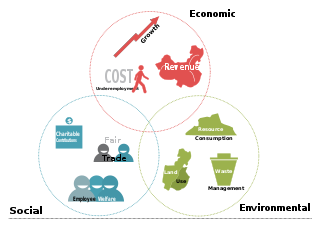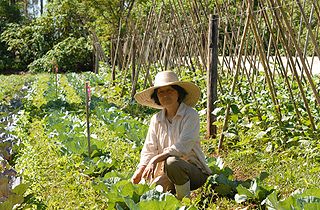
Sustainable development is an organizing principle that aims to meet human development goals while also enabling natural systems to provide necessary natural resources and ecosystem services to humans. The desired result is a society where living conditions and resources meet human needs without undermining the planetary integrity and stability of the natural system. Sustainable development tries to find a balance between economic development, environmental protection, and social well-being. The Brundtland Report in 1987 defined sustainable development as "development that meets the needs of the present generation without compromising the ability of future generations to meet their own needs". The concept of sustainable development nowadays has a focus on economic development, social development and environmental protection for future generations.

Ecological economics, bioeconomics, ecolonomy, eco-economics, or ecol-econ is both a transdisciplinary and an interdisciplinary field of academic research addressing the interdependence and coevolution of human economies and natural ecosystems, both intertemporally and spatially. By treating the economy as a subsystem of Earth's larger ecosystem, and by emphasizing the preservation of natural capital, the field of ecological economics is differentiated from environmental economics, which is the mainstream economic analysis of the environment. One survey of German economists found that ecological and environmental economics are different schools of economic thought, with ecological economists emphasizing strong sustainability and rejecting the proposition that physical (human-made) capital can substitute for natural capital.

Appropriate technology is a movement encompassing technological choice and application that is small-scale, affordable by locals, decentralized, labor-intensive, energy-efficient, environmentally sustainable, and locally autonomous. It was originally articulated as intermediate technology by the economist Ernst Friedrich "Fritz" Schumacher in his work Small Is Beautiful. Both Schumacher and many modern-day proponents of appropriate technology also emphasize the technology as people-centered.

The triple bottom line is an accounting framework with three parts: social, environmental and economic. Some organizations have adopted the TBL framework to evaluate their performance in a broader perspective to create greater business value. Business writer John Elkington claims to have coined the phrase in 1994.
Ecological modernization is a school of thought that argues that both the state and the market can work together to protect the environment. It has gained increasing attention among scholars and policymakers in the last several decades internationally. It is an analytical approach as well as a policy strategy and environmental discourse.

Technological utopianism is any ideology based on the premise that advances in science and technology could and should bring about a utopia, or at least help to fulfill one or another utopian ideal.

Environmental sociology is the study of interactions between societies and their natural environment. The field emphasizes the social factors that influence environmental resource management and cause environmental issues, the processes by which these environmental problems are socially constructed and define as social issues, and societal responses to these problems.

The United Nations Global Compact is a non-binding United Nations pact to get businesses and firms worldwide to adopt sustainable and socially responsible policies, and to report on their implementation. The UN Global Compact is the world's largest corporate sustainability and corporate social responsibility initiative, with 13000 corporate participants and other stakeholders over 170 countries. The organization consists of a global agency, and local "networks" or agencies for each participating country. Under the Global Compact, companies are brought together with UN agencies, labor groups and civil society. Cities can join the Global Compact through the Cities Programme.
Eco-efficiency refers to the delivery of goods and services to meet human needs and improve quality of life while progressively reducing their environmental impacts of goods and resource intensity during their life-cycle.
Ecotechnology is an applied science that seeks to fulfill human needs while causing minimal ecological disruption, by harnessing and manipulating natural forces to leverage their beneficial effects. Ecotechnology integrates two fields of study: the 'ecology of technics' and the 'technics of ecology,' requiring an understanding of the structures and processes of ecosystems and societies. All sustainable engineering that can reduce damage to ecosystems, adopt ecology as a fundamental basis, and ensure conservation of biodiversity and sustainable development may be considered as forms of ecotechnology.
Human overpopulation describes a concern that human populations may become too large to be sustained by their environment or resources in the long term. The topic is usually discussed in the context of world population, though it may concern individual nations, regions, and cities.

An economy is an area of the production, distribution and trade, as well as consumption of goods and services. In general, it is defined as a social domain that emphasize the practices, discourses, and material expressions associated with the production, use, and management of scarce resources. A given economy is a set of processes that involves its culture, values, education, technological evolution, history, social organization, political structure, legal systems, and natural resources as main factors. These factors give context, content, and set the conditions and parameters in which an economy functions. In other words, the economic domain is a social domain of interrelated human practices and transactions that does not stand alone.
Sustainability science first emerged in the 1980s and has become a new academic discipline. Similar to agricultural science or health science, it is an applied science defined by the practical problems it addresses. Sustainability science focuses on issues relating to sustainability and sustainable development as core parts of its subject matter. It is "defined by the problems it addresses rather than by the disciplines it employs" and "serves the need for advancing both knowledge and action by creating a dynamic bridge between the two".

Sustainability is a social goal for people to co-exist on Earth over a long time. Specific definitions of this term are disputed and have varied with literature, context, and time. Experts often describe sustainability as having three dimensions : environmental, economic, and social, and many publications emphasize the environmental dimension. In everyday use, sustainability often focuses on countering major environmental problems, including climate change, loss of biodiversity, loss of ecosystem services, land degradation, and air and water pollution. The idea of sustainability can guide decisions at the global, national, and individual levels. A related concept is sustainable development, and the terms are often used to mean the same thing. UNESCO distinguishes the two like this: "Sustainability is often thought of as a long-term goal, while sustainable development refers to the many processes and pathways to achieve it."
The history of environmental pollution traces human-dominated ecological systems from the earliest civilizations to the present day. This history is characterized by the increased regional success of a particular society, followed by crises that were either resolved, producing sustainability, or not, leading to decline. In early human history, the use of fire and desire for specific foods may have altered the natural composition of plant and animal communities. Between 8,000 and 12,000 years ago, agrarian communities emerged which depended largely on their environment and the creation of a "structure of permanence."
Paul James is Professor of Globalization and Cultural Diversity at Western Sydney University, and Director of the Institute for Culture and Society where he has been since 2014. He is a writer on global politics, globalization, sustainability, and social theory.

A nutrient cycle is the movement and exchange of inorganic and organic matter back into the production of matter. Energy flow is a unidirectional and noncyclic pathway, whereas the movement of mineral nutrients is cyclic. Mineral cycles include the carbon cycle, sulfur cycle, nitrogen cycle, water cycle, phosphorus cycle, oxygen cycle, among others that continually recycle along with other mineral nutrients into productive ecological nutrition.

In economic and environmental fields, decoupling refers to an economy that would be able to grow without corresponding increases in environmental pressure. In many economies, increasing production (GDP) raises pressure on the environment. An economy that would be able to sustain economic growth while reducing the amount of resources such as water or fossil fuels used and delink environmental deterioration at the same time would be said to be decoupled. Environmental pressure is often measured using emissions of pollutants, and decoupling is often measured by the emission intensity of economic output. However, it is arguable that emission intensity does not adequately reflect the exponential impact on the instability of ecosystems when climate tipping points are passed. During the 2023 World Economic Forum Johan Rockstrom explained that the exponential domino effect has now commenced.

Circles of Sustainability is a method for understanding and assessing sustainability, and for project management directed towards socially sustainable outcomes. It is intended to handle 'seemingly intractable problems' such as outlined in sustainable development debates. The method is mostly used for cities and urban settlements.
Engaged theory is a methodological framework for understanding the social complexity of a society, by using social relations as the base category of study, with the social always understood as grounded in the natural, including people as embodied beings. Engaged theory progresses from detailed, empirical analysis of the people, things, and processes of the world to abstract theory about the constitution and social framing of people, things, and processes.